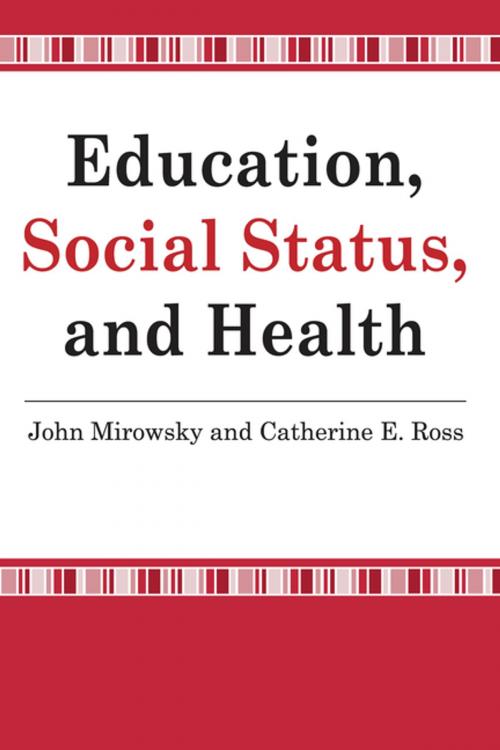Education, Social Status, and Health
Nonfiction, Social & Cultural Studies, Social Science, Sociology| Author: | John Mirowsky | ISBN: | 9781351328067 |
| Publisher: | Taylor and Francis | Publication: | September 8, 2017 |
| Imprint: | Routledge | Language: | English |
| Author: | John Mirowsky |
| ISBN: | 9781351328067 |
| Publisher: | Taylor and Francis |
| Publication: | September 8, 2017 |
| Imprint: | Routledge |
| Language: | English |
Education forms a unique dimension of social status, with qualities that make it especially important to health. It influences health in ways that are varied, present at all stages of adult life, cumulative, self-amplifying, and uniformly positive. Educational attainment marks social status at the beginning of adulthood, functioning as the main bridge between the status of one generation and the next, and also as the main avenue of upward mobility. It precedes the other acquired social statuses and substantially influences them, including occupational status, earnings, and personal and household income and wealth. Education creates desirable outcomes because it trains individuals to acquire, evaluate, and use information. It teaches individuals to tap the power of knowledge. Education develops the learned effectiveness that enables self-direction toward any and all values sought, including health.
For decades American health sciences has acted as if social status had little bearing on health. The ascendance of clinical medicine within a culture of individualism probably accounts for that omission. But research on chronic diseases over the last half of the twentieth century forced science to think differently about the causes of disease. Despite the institutional and cultural forces focusing medical research on distinctive proximate causes of specific diseases, researchers were forced to look over their shoulders, back toward more distant causes of many diseases. Some fully turned their orientation toward the social status of health, looking for the origins of that cascade of disease and disability flowing daily through clinics.
Why is it that people with higher socioeconomic status have better health than lower status individuals? The authors, who are well recognized for their strength in survey research on a broad national scale, draw on findings and ideas from many sciences, including demography, economics, social psychology, and the health sciences. People who are well educated feel in control of their lives, which encourages and enables a healthy lifestyle. In addition, learned effectiveness, a practical end of that education, enables them to find work that is autonomous and creative, thereby promoting good health.
Education forms a unique dimension of social status, with qualities that make it especially important to health. It influences health in ways that are varied, present at all stages of adult life, cumulative, self-amplifying, and uniformly positive. Educational attainment marks social status at the beginning of adulthood, functioning as the main bridge between the status of one generation and the next, and also as the main avenue of upward mobility. It precedes the other acquired social statuses and substantially influences them, including occupational status, earnings, and personal and household income and wealth. Education creates desirable outcomes because it trains individuals to acquire, evaluate, and use information. It teaches individuals to tap the power of knowledge. Education develops the learned effectiveness that enables self-direction toward any and all values sought, including health.
For decades American health sciences has acted as if social status had little bearing on health. The ascendance of clinical medicine within a culture of individualism probably accounts for that omission. But research on chronic diseases over the last half of the twentieth century forced science to think differently about the causes of disease. Despite the institutional and cultural forces focusing medical research on distinctive proximate causes of specific diseases, researchers were forced to look over their shoulders, back toward more distant causes of many diseases. Some fully turned their orientation toward the social status of health, looking for the origins of that cascade of disease and disability flowing daily through clinics.
Why is it that people with higher socioeconomic status have better health than lower status individuals? The authors, who are well recognized for their strength in survey research on a broad national scale, draw on findings and ideas from many sciences, including demography, economics, social psychology, and the health sciences. People who are well educated feel in control of their lives, which encourages and enables a healthy lifestyle. In addition, learned effectiveness, a practical end of that education, enables them to find work that is autonomous and creative, thereby promoting good health.















